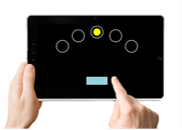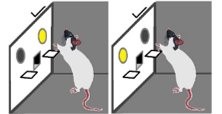Cognitive Testing in Pain Research

Cognition is a general term that encompasses several neuropsychological processes, including attention, memory and problem solving. Pain and cognition have long been thought to be intertwined. Cognitive dysfunction often accompanies pain, and pain has an important cognitive-evaluative component. Neuroanatomical and neurochemical mechanisms might be shared between pain and cognition. Disrupted cognition undermines a person’s ability to cope, to complete daily tasks and maintain a high quality of life, whereas good cognitive function predicts treatment success.
Translational cognitive tests across species

Tests of everyday memory evaluate memory functions that enable us to navigate the world during day-to-day tasks. The Delayed-matching-to-place (DMT) test measures the ability of rodents to navigate through space relying on rapid updating of place memory, which is highly dependent on the hippocampus, a region in the temporal lobes of our brain.

It mimics everyday tasks, such as the Car-Park problem, where we need to remember where we parked our car on a specific occasion in order to return to the car.

The DMT water maze task assesses hippocampus-dependent spatial memory performance (see Bast et al., 2017 for more information). The task requires rats to locate a hidden platform, the position of which is changed daily, in order to escape the pool of water. DMT test has been reverse-translated to be used with humans in real or virtual environments (see Bauer et al., 2021 for more information). Other everyday memory tests used with human participants in the Arthritis UK Pain Centre include the Consortium to Establish a Registry for Alzheimer's Disease (CERAD) neurocognitive test battery which assesses immediate recall (memory), animal naming (semantic fluency), letter cancellation (visuospatial) and delayed word recall (memory).

Tests of attention evaluate a state of alertness, an ability to actively engage with the surroundings and process the information while tuning out non relevant details. The five-choice-serial-reaction-time (5CSRT) task in rodents resembles human continuous performance tasks and provides information about the animals’ attentional ability and response control (see Pezze et al., 2014 for more information).

In this task, the rats are required to sustain and divide attention across a row of apertures to detect brief light flashes that occur at random. The 5CSRT task has been developed based on the continuous performance task (CTPs), which has long been used to measure selective and sustained attention in human participants (see Robbins, 2002 for more information).


Tests of Cognitive Flexibility evaluate the ability to adapt one’s behaviour and thinking in response to ever-changing demands of our environment. Similar tests for studying cognitive flexibility can be used in humans and rodents (see Maggi et al., 2022 for more information). The tests involve animals or human participants learning to follow certain task rules (e.g., press a certain lever or button) and then require them to switch their behavioural strategies in response to rule changed (e.g., press the other lever or button). Bayesian approaches can be used to measure the probability of different choice strategies on a trial-by-trial basis, providing information about the time when the learning has occurred and the exploratory strategies that are used during the learning process. The Cambridge Neuropsychological Test Automated Battery (CANTAB) for human participants combines tests of several aspects of cognitive flexibility, which involve button presses on a touch screen.
If you are interested to know more about cognitive tests used within Arthritis UK Pain Centre, please contact Tobias Bast.
View our publications that have used cognitive testing